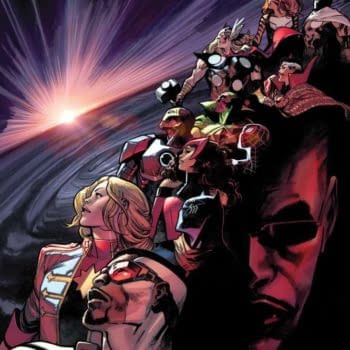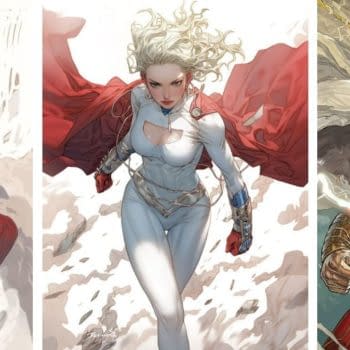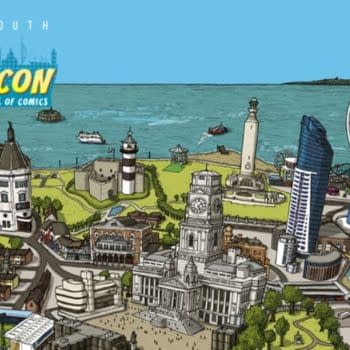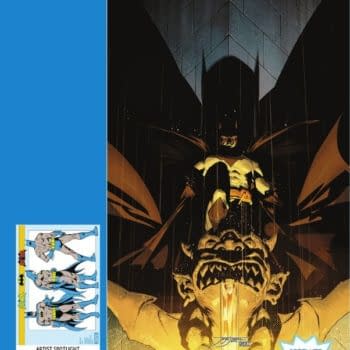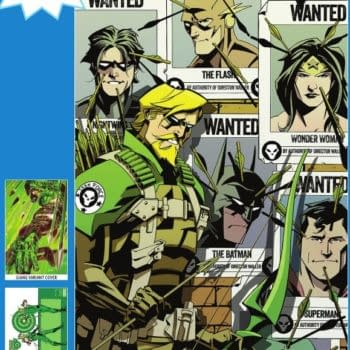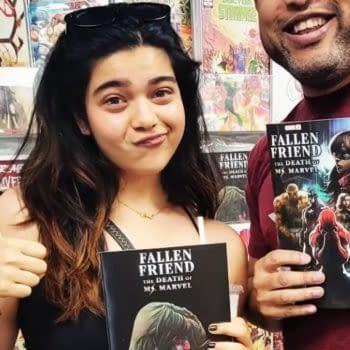Posted in: Comics | Tagged: charles soule, Comics, entertainment, letter 44, oni press, syfy
Talking To Charles Soule About Getting Letter 44 On TV And Writing Eleven Comics In September

Charles Soule: Well, while one certainly doesn't have to watch it with a mango nearby, it's not up to me to tell folks how to enjoy their filmed entertainment. Letter 44, as far as I know at this point, will be on TV, airing regularly as an hourlong drama. Now, I should stress that so much can change between here and there – a writer friend of mine once told me a story about a show he'd put together, cast with bankable stars, with a filmed pilot and strong positive responses from both the studio and several rounds of test screenings. It was ready to be announced on the fall slate, and my pal was about half a step from buying a golden helicopter. The show had one final test screening in Las Vegas maybe a week before the announcement, occupied by people who were snagged off the Strip for the purpose – it didn't go as well, and boom, the whole thing sank without a trace.
So, you know, you're not there until you're there. But the comic's about an epic journey – seems fitting that the show could have one too. That said, everything seems pretty positive right now, and I'm an optimist by nature. Certainly, strong ongoing support for the comic won't hurt!
RJ: How much of your original creation of the series was with an eye for other media?
CS: I don't do that. I know that some stories are easier to adapt than others, but the idea is to make good comics first. A crappy comic gets no one's attention, and then no one ever wants to adapt it. It's the strength of the work (in any medium) that gets people thinking about how it might be translated. As we move into the second arc on the comic, you'll see that things start to happen that would be very difficult to pull off in a filmed fashion – I want to tell the story I want to tell, and then we'll just see what happens with a TV version. Still, we've seen some truly epic scope on TV in the past – I think Battlestar Galactica is a good example, but there are others – so who knows? Maybe they can pull off more than I think they can.
RJ: There are aspects of the comic that are almost an apologia for the excesses of George Bush, as if there were secret justifiable reasons for the wars he started. There's even another view of Obama's continuance of some of those policies. How has that gone down and is it the kind of thing you'd like to see preserved for the show?
CS: I would like to see it preserved, but I wouldn't call it an apologia, necessarily. I would say that being President is an extremely complicated job, with a vast portion of the day-to-day decision-making, and the reasons for those decisions, being hidden from the public by virtue of necessity. I do agree that Obama has continued, and massively expanded in some instances, the policies of Bush, particularly with respect to the use of drones. There's a book called Dirty Wars by Jeremy Scahill that makes this incredibly clear, at least to me. It covers the alteration in US military policy from just before 9/11 to the present, with a discussion of what a sea change it's really been. Obama's doing things in his own way, but there's definitely a throughline in national policy.
A main theme in Letter 44 is just that you don't know what the job is going to actually be when you're running for office. You only find out after, when they open the secret files to you and you begin to get those daily national security briefings.
President Blades in the book is not Obama, and former President Carroll is not Bush. But I do think this story resonates with people because they can see it from a number of political viewpoints.
Anything is justifiable if you jump through enough hoops of rationalization, and there are entire positions in the Executive Branch designed to help Presidents do exactly that.
RJ: The comic centres on an insanely large conspiracy at the heart of government. Do you think it is possible to keep such a thing secret in the days of gossip sites, Wikileaks and Edward Snowden?
CS: Well, one thing to point out is that the comic is on that 2-year shifted timeline we saw in The West Wing, so Blades comes into office for his first term in 2006, not 2008. (You can actually see some of that in the uniform designs of the Joint Chiefs in Issue 1, for example, although that was a pretty subtle detail.) So, we're a few years off from the sort of reveals we've gotten more recently. That was a conscious choice for a number of reasons probably too long to get into here, but it was mostly to give me a little room to move before I catch up with the present – which I'll do eventually.
Now, back to your original question – I think it would be very, very hard to keep it secret forever, but it could be done in a manner that could keep it secret for a while. Massive compartmentalization, people only working on parts of the project without being told the whole thing… I mean, there's a strong argument for keeping it secret if you're one of the guys on the inside. You know that there's a decent chance the world could go nuts if word gets out, and you know that everything possible is being done – including the Clarke mission – to learn what we can and prepare. So, it becomes almost a holy mission – it's not like it's torturing prisoners in Gitmo. It's a legit attempt to save the world. Project Monolith is a no-BS noble cause, and it's easier to keep those secret, I think.
A lot of the third arc of the story will be devoted to those sort of questions – how the hell did the US do this – and I'm looking forward to writing it very much. I've been fortunate to make contact with a number of very smart people with very cool jobs – astronomers and NASA engineers and such, and they've been helping me to lock down the details there.
RJ: Bleeding Cool has been a fan of Letter 44 from the get go. Has the overwhelmingly positive response to the comic helped its transference to TV or does that kind of thing make no difference whatsoever?
CS: You guys have been big supporters of the series, and let me formally thank you right here for that. The early buzz on a series is crucial, because it can get people to check out that #1 when they might not otherwise do it. Oni did a whole bunch of things to get people to try it, from pricing the first issue at $1 (it remains by far the easiest thing for me to sell at cons) to putting the entire #1 up for free on i09.com. I think we were all pretty behind the series, and hopeful people would find it – but as Oni has told me repeatedly, they are a comics publisher. While they do have a production arm, and a TV show would certainly make all of us very happy, the idea is to publish a great series that people dig. I sign as many Letter 44s at shows as I do Superman / Wonder Womans, for example, and that is a damn good feeling.
I think it certainly didn't hurt the ancillary chances that the comic is doing well. However, I also know that discussions were happening before it ever hit, just based on the concept. From the limited experience I have in that world, it seems that Hollywood is just desperate for hooks, for ideas. Your comic could sell 100 copies or 100,000 – if the idea is strong, you've got a shot out there, if you can get it in front of the right person.
RJ: Are you looking to get a cameo, Stan Lee style?
CS: Who isn't looking to get a Stan Lee-style cameo? I think I could play a mailman or Hugh Hefner or random bystander being rescued just as well as the next guy. I also think I'd be a damn fine Secretary of Energy, if it comes to that.
RJ: In September, it's possible you might have more comics on the stand than I have fingers on my hand. Alongside a TV series and your law firm, how many clones are there of you? And is "Soule" a pun that we haven't got yet? Is there really only one of you?
CS: There really, truly is only one of me. In September, I will have… pauses to count… eleven comics on the stand, not including things like the first Superman/Wonder Woman hardcover, which I believe is out that month as well. I'm not trying to break any records – projects just come up, and September seems to be a month when both Marvel and DC do some interesting things with their lineups. So, unless you've got a Count Rugen thing going on, then yeah, I think I've got your hands beat.
I did a whole blog post on this not long ago that was intended to demystify my workload a little. That's here. Mostly, it's just hard, focused effort and time-management skills. I make a lot of lists, and I try to use every moment as an opportunity to be thinking about stories. The main thing is that it's not work to me, in the ditch-digging cubicle-dwelling sense of that word. I get to write stories featuring some of the most well-known characters in the world, alongside my own books and other projects. When I'm not doing that, I'm running my own successful business. And when I'm not doing either of those things, I'm usually playing music or doing other things I enjoy. I'm not overworked, I'm lucky.
RJ: You came in on Inhuman when Fraction walked. You're killing off Wolverine in what appears to be an editorially mandated plot twist. You've taken over DC books without fuss, in an environment full of editorial micro management. Compared to Letter 44, how do you switch from what appears to be full freedom to comic by dictat? And is it as extreme as it is often caricatured by the likes of Bleeding Cool?
CS: I would disagree with many of the contentions in that paragraph – my experience has been generally very good at the Big 2. I think you can find freedom within structure, and it's a challenge I tend to welcome. "Editorial mandates…" makes it sound like jackbooted thugs are running out and trampling on the ideas of poor, maligned writers and artists. While I think that sometimes things like that can happen, I have found that editors usually know that dictating to writers doesn't get good results. If a creator hates what he's creating, then it's never going to be as good. Big 2 work is about compromise, at its very heart – art vs. commerce. I would say that art itself is sometimes about art vs. commerce – we all gotta eat.
Everyone finds their own way through that stuff, and sure, it's not always easy. My line isn't necessarily the same as other writers' line, but ultimately, hopefully, it's about being okay with your name being on the cover. Which I am!






